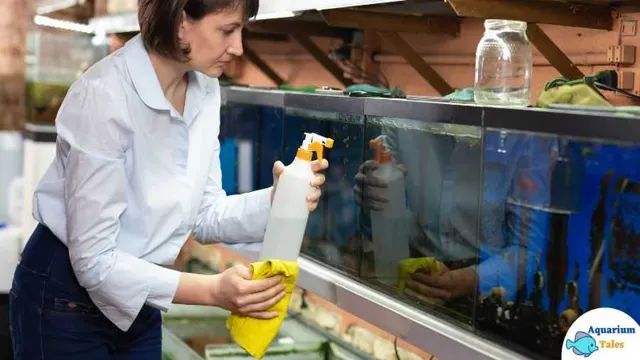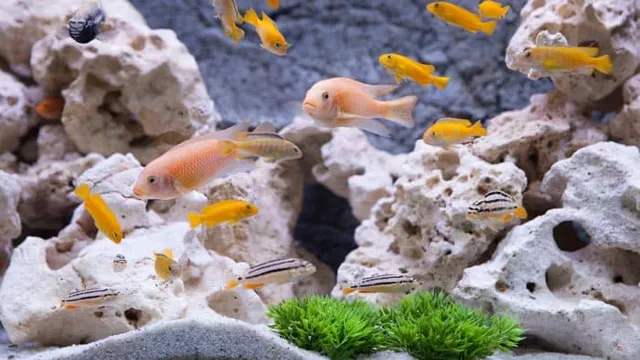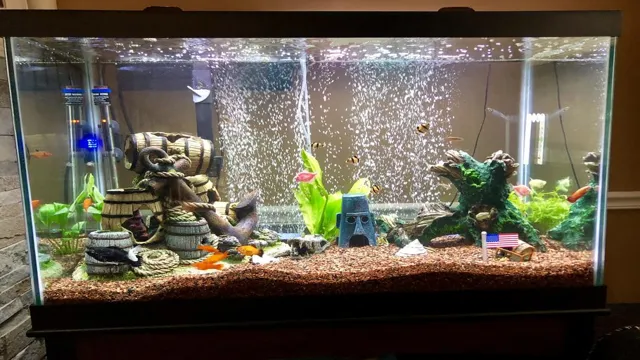Constipation is not only a problem faced by humans; it can affect our aquatic pets too. Aquarium fish are susceptible to this condition, and it can cause severe health problems if left untreated. Constipation in fish results from various factors such as overfeeding, improper diet, low fiber intake, and inadequate water temperature and quality.
It can lead to distress, bloating, swim bladder disorders, and even death if not resolved. So, what can fish owners do to alleviate constipation in their beloved fish? In this blog, we’ll explore simple and effective ways to cure constipation in aquarium fish, including diet changes, water temperature adjustments, and other home remedies. Learning how to prevent and treat constipation in fish can improve their health and happiness, allowing them to thrive in their underwater world.
Understanding constipation in fish
If you notice that your aquarium fish are swimming slower than normal or are less active, it could be a sign that they are constipated. Constipation in fish is a common problem, and its causes can be dietary factors, overfeeding, or water quality issues. When fish eat too much, or when the type of food they consume is difficult to digest, it can impair the digestive system’s function and lead to constipation.
To cure constipation in your aquarium fish, try feeding them a diet that includes more fiber and easily digestible food. Also, ensure that you don’t overfeed them, as it can lead to more digestive distress. In some cases, adding aquarium salts might also help to improve water quality and relieve constipation.
With this kind of care, your fish should be back to their active selves in no time!
Symptoms and causes
Constipation is a common issue faced by fish owners, and it is important to understand its symptoms and causes to ensure the overall health of the fish. A constipated fish may show signs of difficulty passing feces, bloating, loss of appetite, and lethargy. The primary cause of constipation in fish is an improper diet that lacks fiber and is too high in protein.
Another commonly known cause is overfeeding, which can lead to the accumulation of undigested food in the digestive tract. To prevent constipation, fish owners should provide a balanced diet that includes fiber-rich foods such as vegetables and fruits. Additionally, feeding small amounts several times a day instead of one large meal could also help reduce the risk of constipation in fish.
Therefore, keeping an eye on the symptoms and understanding the causes of constipation in fish can help prevent any potential health problems and keep the fish happy and healthy.

Preventing constipation
Constipation in fish is a common problem that fish enthusiasts may come across. It occurs when a fish’s digestive system becomes overloaded, and waste material becomes hard and difficult to pass. This condition can lead to serious health issues such as bloating, swim bladder problems, and even death.
Preventing constipation in fish requires maintaining a healthy diet, appropriate feeding schedules, and adequate tank conditions. Providing a diverse and balanced diet that includes both commercial fish food and live or frozen foods can help prevent constipation. Feeding smaller, more frequent meals to your fish can also aid in digestion and reduce the likelihood of constipation.
Additionally, ensuring a clean and well-maintained tank can prevent the buildup of waste material and promote overall fish health. By taking these simple steps, fish owners can ensure that their aquatic pets remain healthy and free of constipation-related issues.
Treating constipation in fish
If you notice your aquarium fish struggling with constipation, there are several steps you can take to help them feel better. First and foremost, consider their diet. Fish that eat a lot of processed foods or high-fat meals are more prone to constipation. (See Also: How to Clean Aquarium LED Lights: Tips and Tricks for a Crystal-Clear Tank)
Look for specially formulated foods that can help regulate their digestion. You can also try adding some fiber to their diet, such as peas or blanched lettuce. Increasing the water temperature of the tank can also aid in digestion, as can adding Epsom salt to the tank.
Be mindful of the amount of food and frequency of feedings as overfeeding is a common cause of constipation. If your fish are still struggling, it may be time to consult with a veterinarian who specializes in fish health to diagnose and treat any underlying conditions.
Dietary changes
If you’re dealing with constipation in your fish, dietary changes might help to alleviate this issue. Just like humans, fish require a healthy and balanced diet to keep their digestive system functioning properly. It’s essential to provide your fish with high quality, nutritious food that’s appropriate for their species.
For example, some fish may benefit from a diet that’s higher in fiber, while others may require more protein. You may want to experiment with different brands or types of fish food to find what works best for your fish. Additionally, you can incorporate fresh or frozen vegetables into their diet to help with digestion.
Peas are a particularly good choice due to their high fiber content. Remember to always monitor your fish’s eating habits and make adjustments as needed. By making dietary changes, you can help your fish overcome constipation and stay healthy and happy.
Laxatives and medications
When it comes to treating constipation in fish, laxatives and medications can be effective solutions. However, before administering any medication, it’s important to properly diagnose the cause of constipation. Fish may suffer from constipation due to a variety of reasons such as overfeeding, low fiber diet, or stress.
Laxatives, such as Epsom salt or docusate sodium, can help soften the stool and promote bowel movements in fish. Medications such as Metoclopramide or Polyethylene glycol may also be prescribed by a veterinarian if necessary. It’s important to follow dosage instructions carefully to avoid any adverse effects on your fish’s health.
Remember, in addition to medication, it’s important to address the root cause of constipation by adjusting feeding habits and providing a well-balanced diet to your fish.
Manual relief
When it comes to treating constipation in fish, manual relief can sometimes be necessary. This involves gently applying pressure to the fish’s abdomen to help stimulate a bowel movement. However, it is important to be very careful when attempting manual relief, as too much pressure can harm the fish.
Another method to try is adding Epsom salt to the fish’s tank. The salt can help to soften the feces and make it easier for the fish to pass. Additionally, increasing the fiber in the fish’s diet can also help to prevent constipation.
This can be done by feeding the fish vegetables or a high-fiber fish food. Remember to always monitor your fish closely and consult with a veterinarian if you have any concerns about your fish’s health. With proper care and attention, a constipated fish can recover quickly and get back to their happy and healthy self. (See Also: How to Maintain pH in Planted Aquarium and Keep Your Aquatic Plants Thriving)
When to seek professional help
If you’re wondering how to cure constipation in your aquarium fish, it’s important to first address the underlying cause. Constipation can be caused by a number of factors, including overfeeding, improper diet, and poor water quality. To start, try reducing the amount of food you’re feeding your fish and make sure their diet is balanced and appropriate for their species.
You can also try soaking their food in water or adding a small amount of boiled, mashed peas to their diet to help promote digestion. It’s important to monitor your fish closely and ensure their water quality is optimal, as poor water conditions can also contribute to constipation. However, if you’ve tried these methods and your fish still seem constipated or are exhibiting other concerning symptoms, it may be best to seek professional help from a veterinarian or aquatic specialist.
They can perform a thorough examination and provide personalized treatment options to help your fish feel their best.
Signs of serious illness
As we go through life, it’s essential to pay attention to our bodies and look out for any signs of serious illness. While it’s normal to experience occasional aches and pains, there are some symptoms that indicate it’s time to seek professional help. For starters, anything sudden or severe should not be ignored.
If you’re experiencing symptoms like chest pain, shortness of breath, or sudden numbness, it’s vital to seek immediate medical attention. Other symptoms that may be more subtle but still require medical attention include unexplained weight loss, prolonged fever, or persistent fatigue. Your body communicates in ways that can sometimes be difficult to decipher, so it’s essential to listen to what it’s saying and seek help if needed.
Remember, the sooner you seek medical attention, the better the chances of a full recovery.
Importance of regular checkups and water quality maintenance
Regular checkups and water quality maintenance are crucial to keep your pool in pristine condition. You don’t want to wait until there’s a problem to seek professional help. It’s important to have a routine schedule of checking the chemical levels, pH, alkalinity, and sanitizing levels.
Keeping track of these levels will help prevent issues like pool staining, algae buildup, and cloudiness. Additionally, the quality of your pool’s water should be maintained by changing it every few years, depending on usage and general upkeep. If you notice any changes or issues with your pool, such as a drastic drop in pH, then it’s time to call in a professional to evaluate and address the issue promptly.
Waiting too long can lead to more significant problems and pricey repairs. Overall, being proactive and attentive to your pool’s maintenance will save you both time and money in the long run.
Conclusion
In conclusion, keeping your aquarium fish regular and healthy is crucial for their overall well-being. To cure constipation, consider including plenty of fiber-rich foods, like peas or spirulina, in their diet and ensure they have proper filtration and water quality. And as always, don’t be afraid to ask your fish if they need some Miralax or a good old prune juice chaser. (See Also: How to Prevent Fungus in Aquariums: Tips for a Healthy and Vibrant Underwater Ecosystem)
Your fish will thank you for it. After all, a clean colon is a happy colon, even for fish!”
FAQs
What causes constipation in aquarium fish?
Constipation in aquarium fish can becaused by overfeeding, lack of fiber in their diet, or stress.
How can I prevent constipation in my aquarium fish?
To prevention constipation in your aquarium fish, feed them a balanced diet with plenty of fiber and avoid overfeeding them. Also, make sure they have a stress-free environment.
What are the symptoms of constipation in aquarium fish?
The symptoms of constipation in aquarium fish are bloating, trouble swimming or floating, lack of appetite, and stringy feces.
Can constipation be fatal for aquarium fish?
Yes, if left untreated, constipation can lead to more severe health problems and can even be fatal for aquarium fish.
What kind of food should I feed my constipated aquarium fish?
You can feed your constipated aquarium fish a diet high in fiber, such as peas or spinach. You can also try fasting them for a day or two to help clear their digestive system.
How long does it take for constipation to clear up in aquarium fish?
The time it takes for constipation to clear up in aquarium fish depends on the severity of the case and the treatment plan. With proper treatment and care, it can take a few days to a week for the fish to recover.
Do I need to clean the aquarium after my fish has been constipated?
It is recommended to do a partial water change and siphon out any excess food or waste that may have accumulated in the aquarium. This will help maintain a healthy environment for your fish to recover in.







